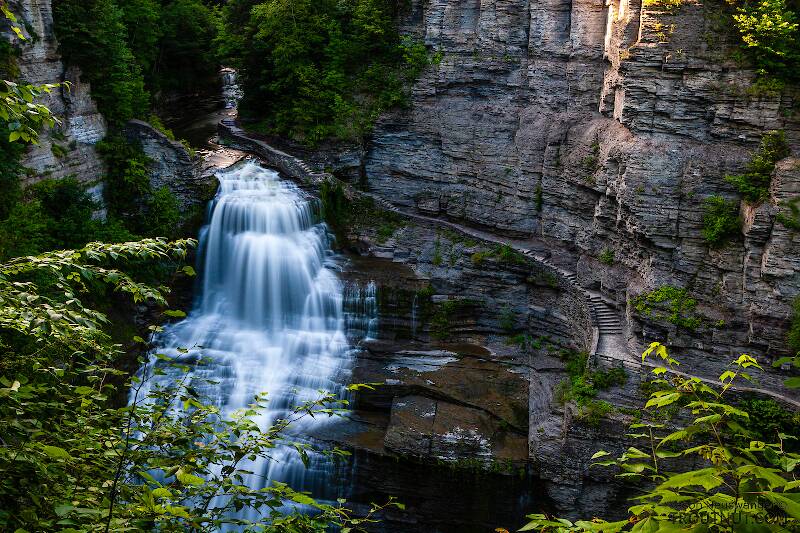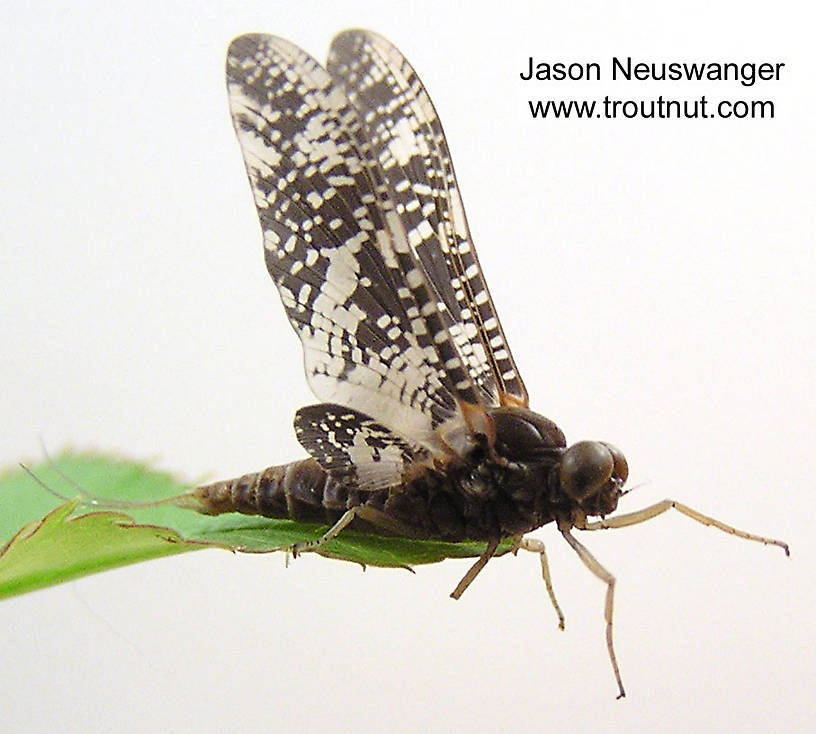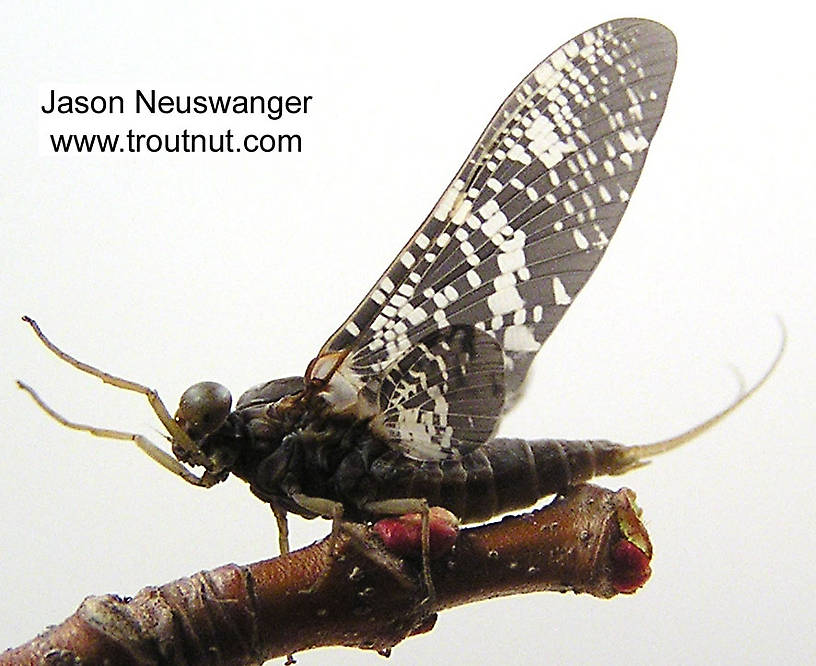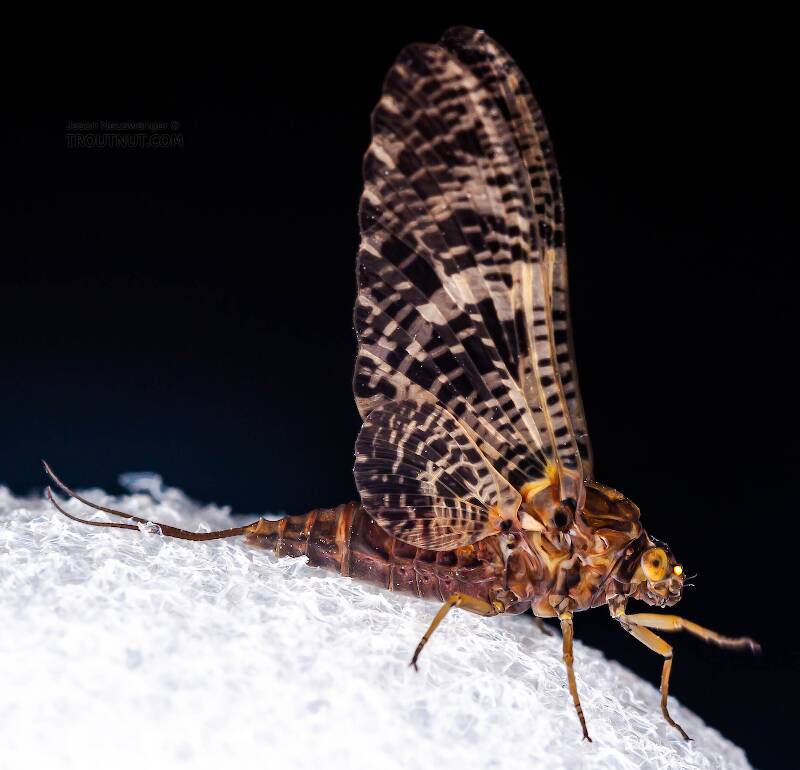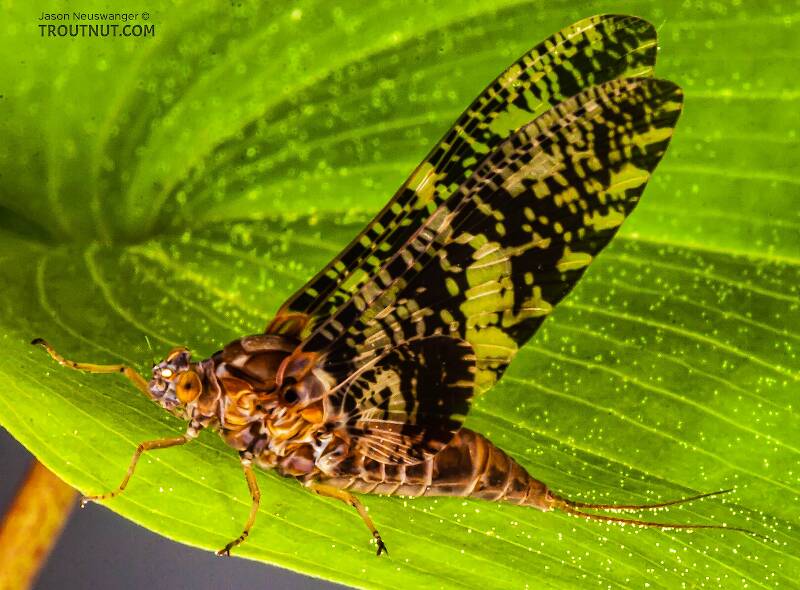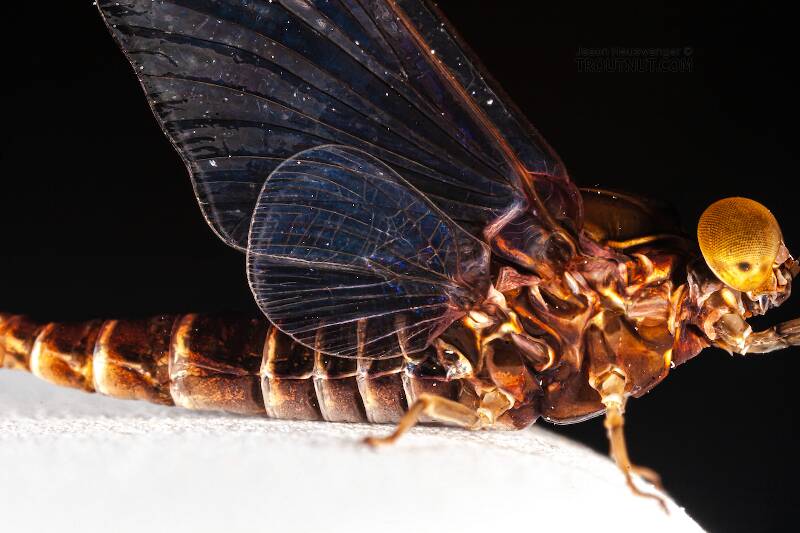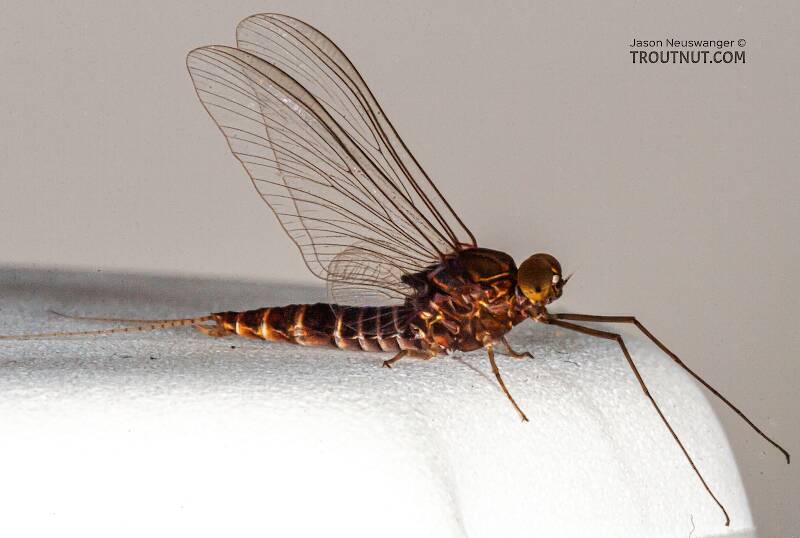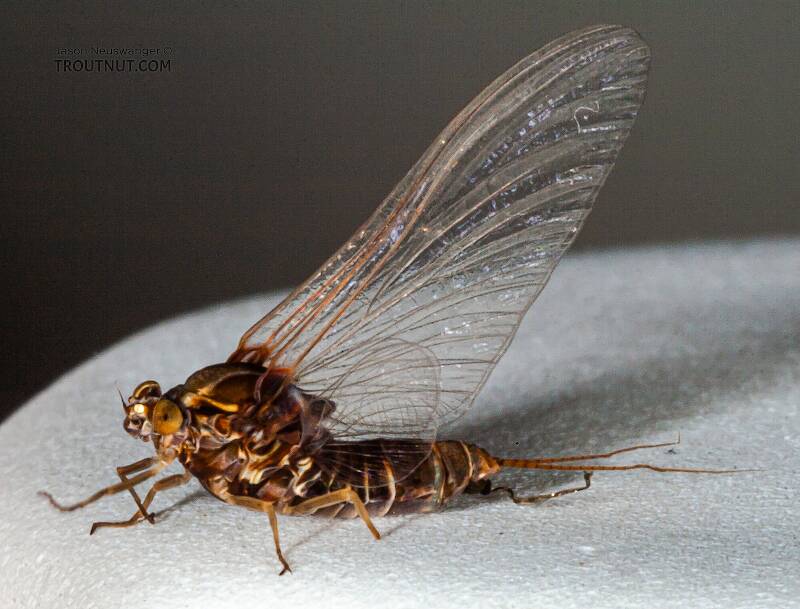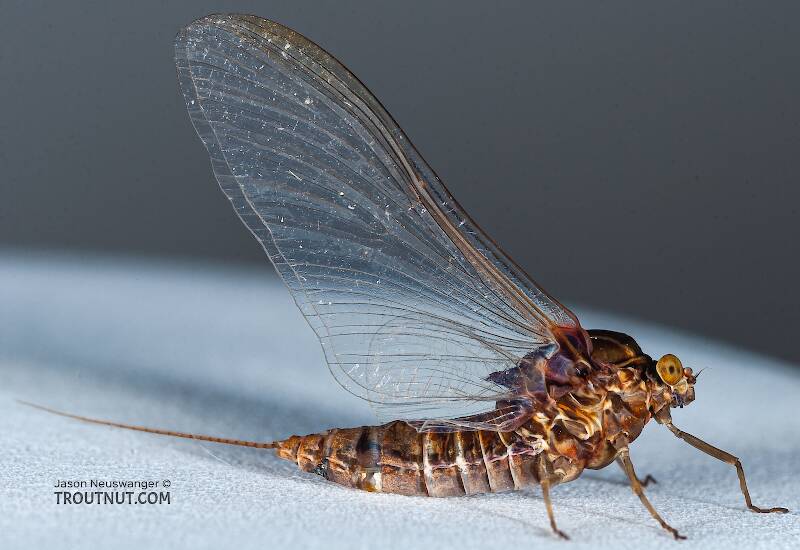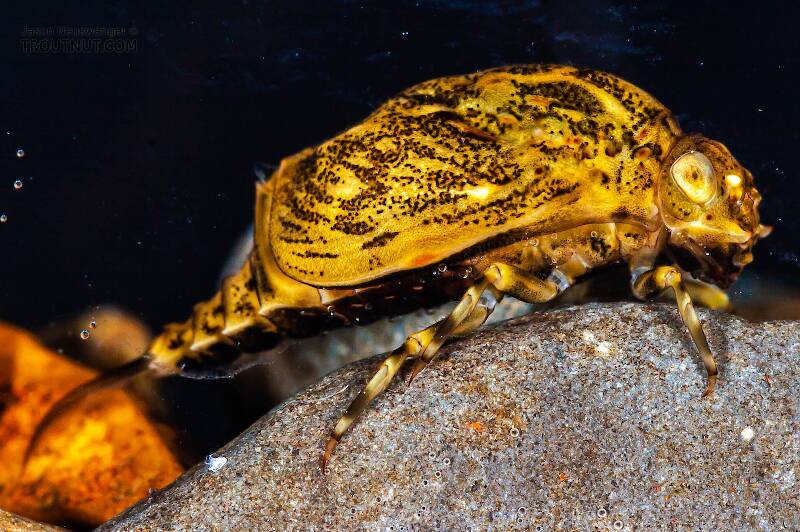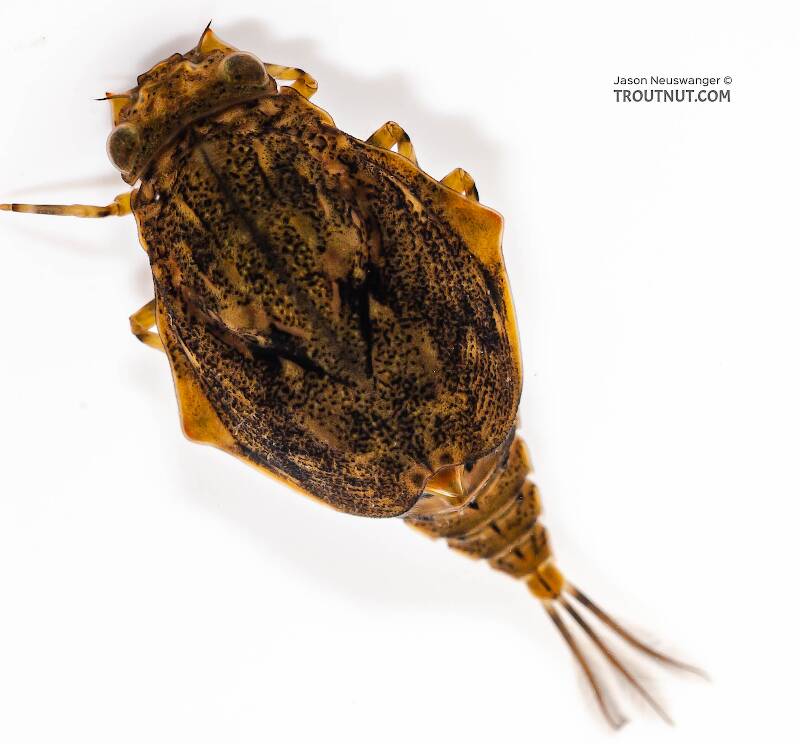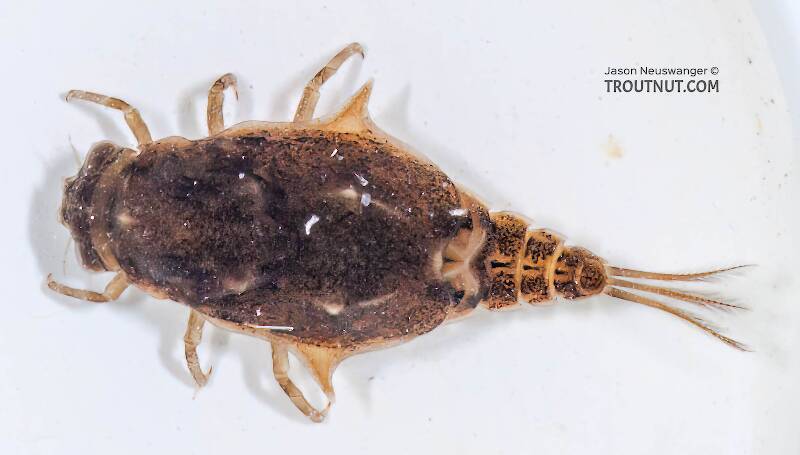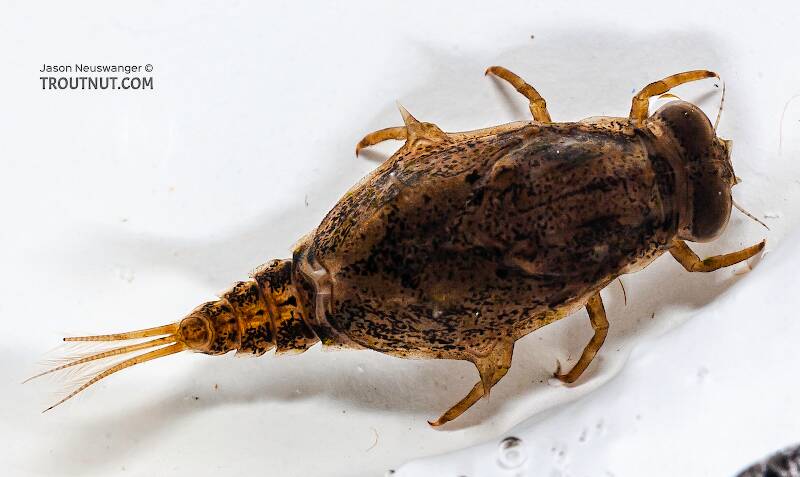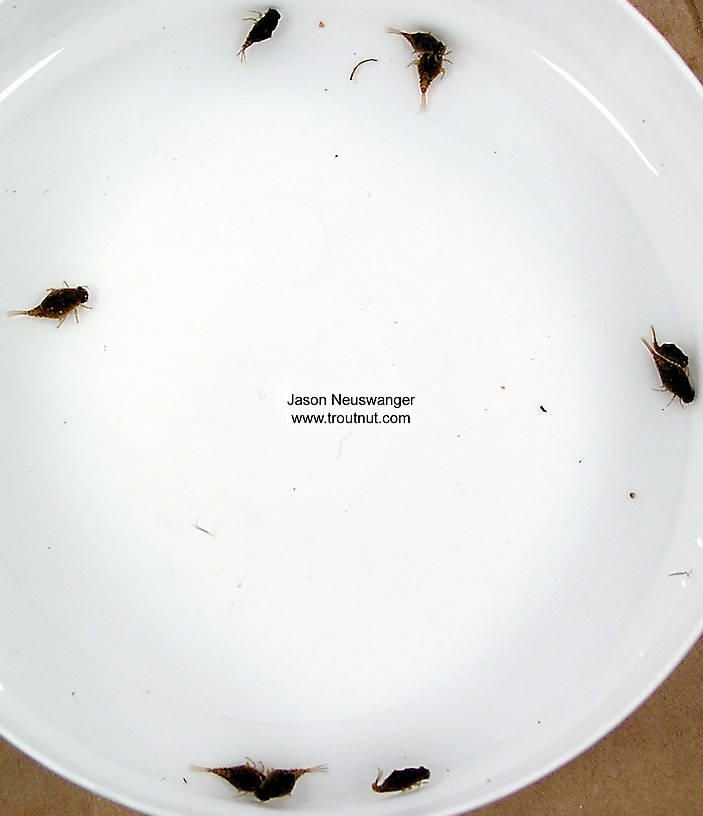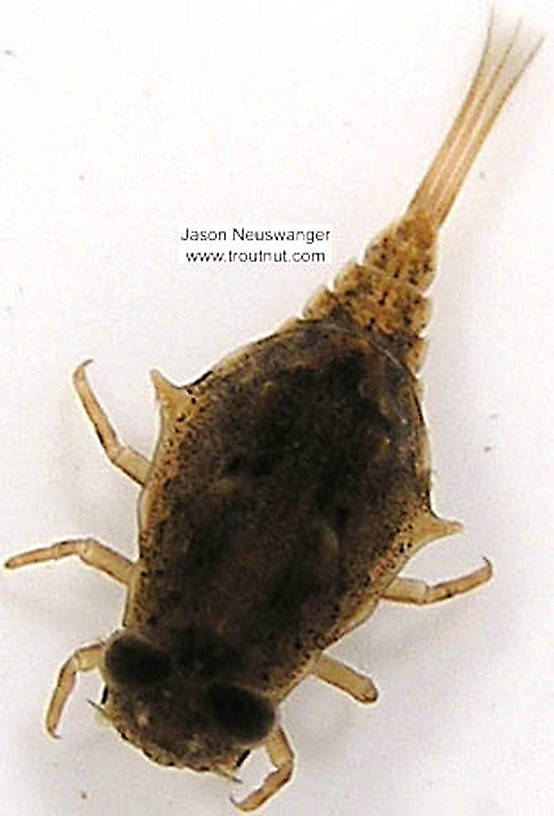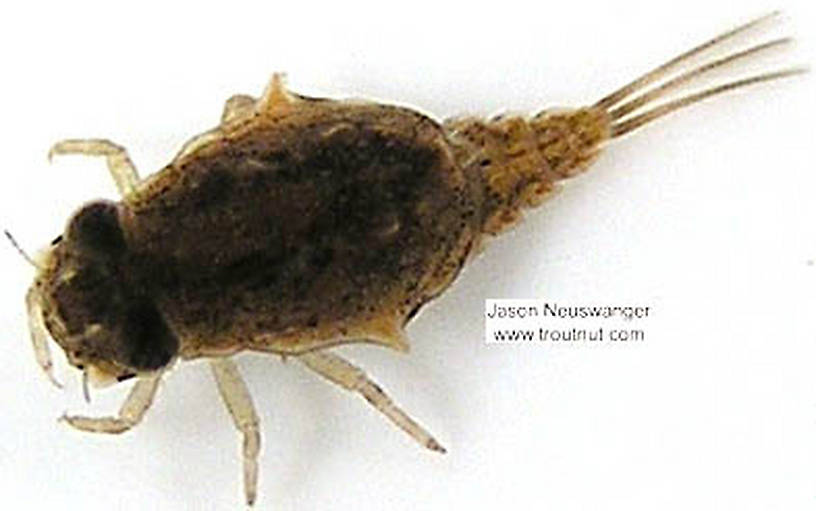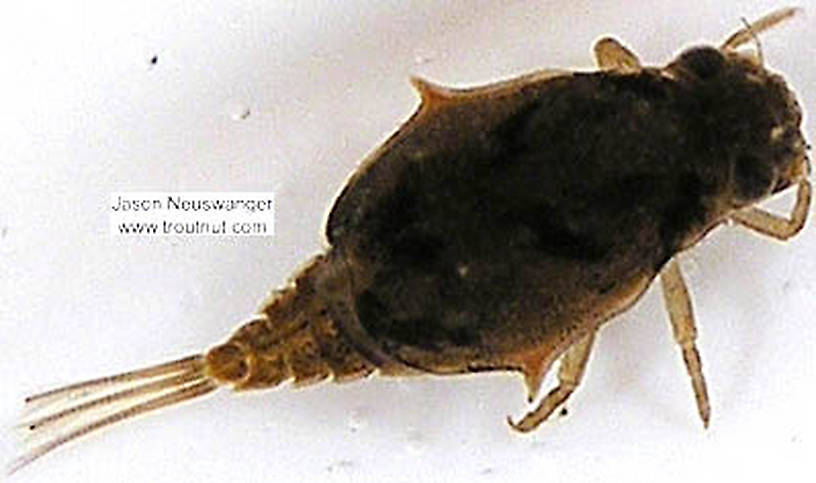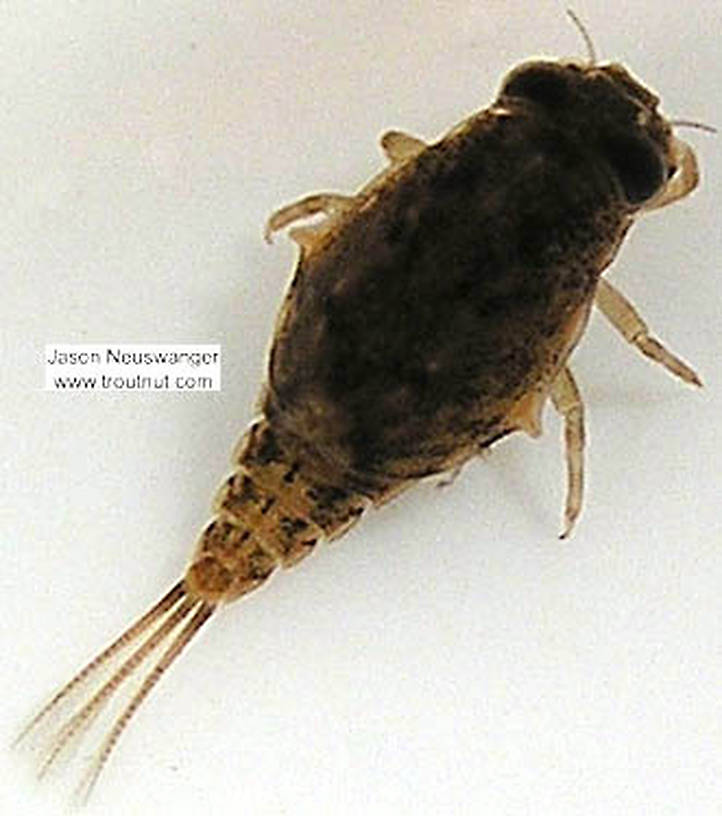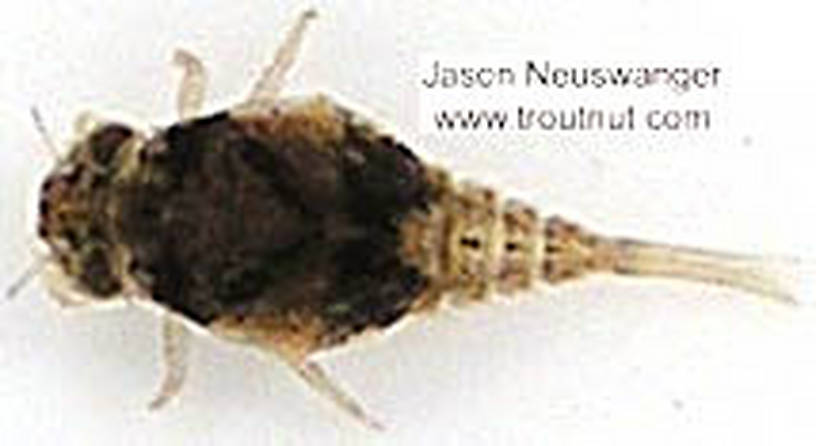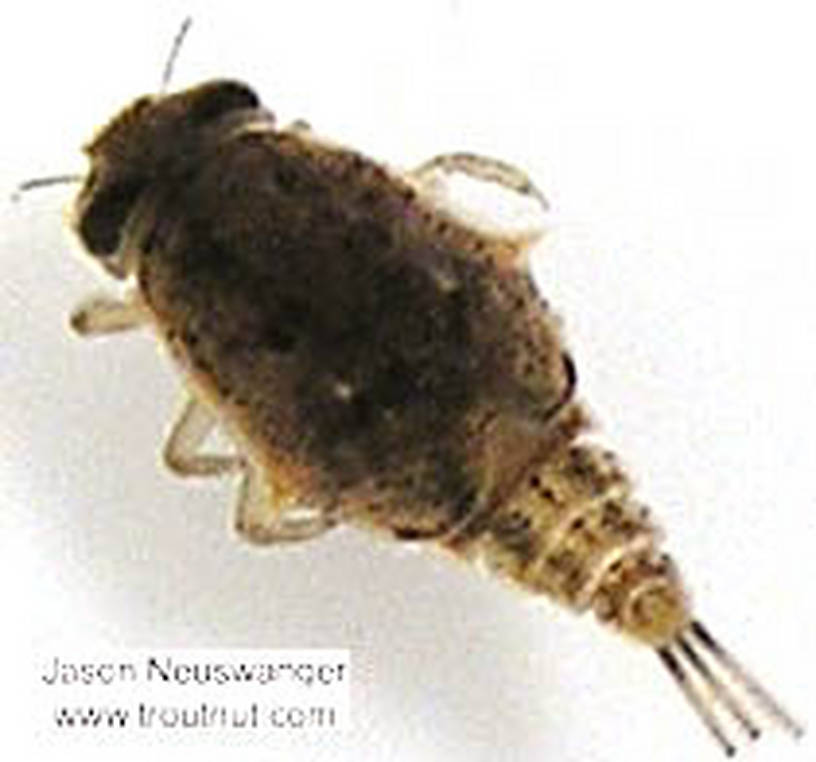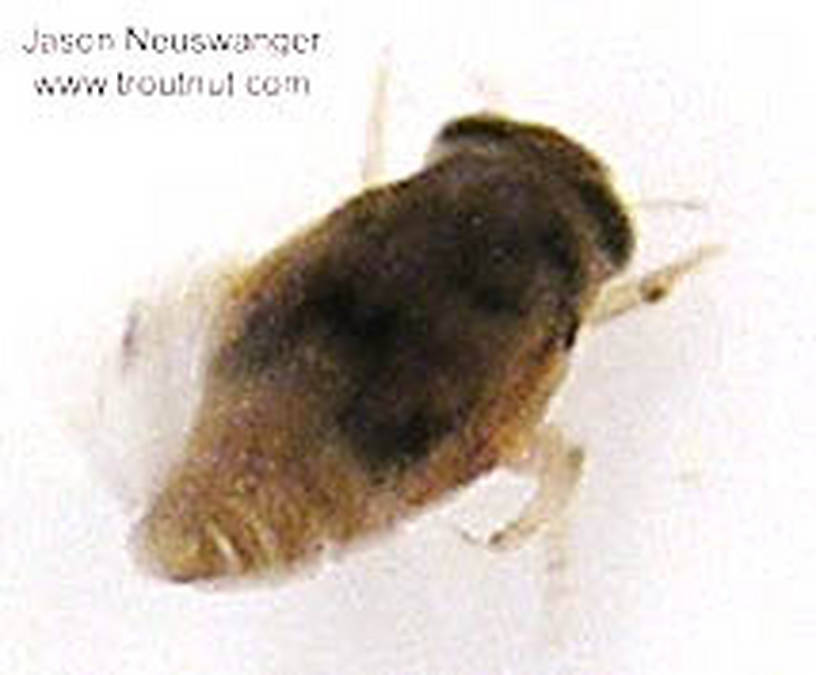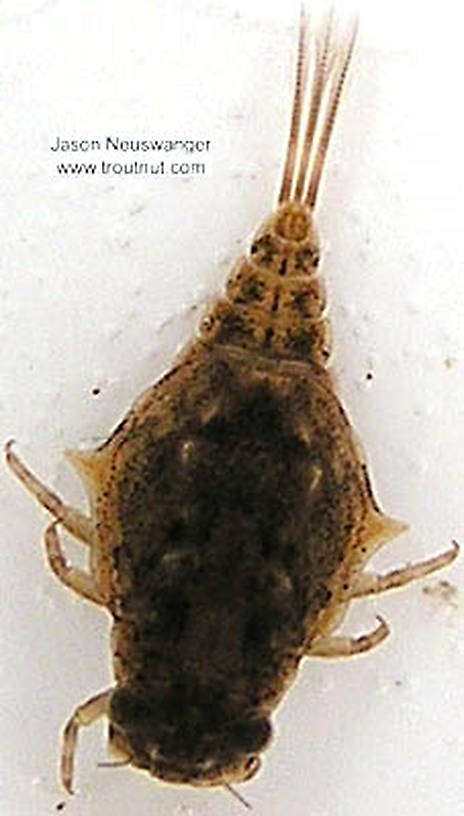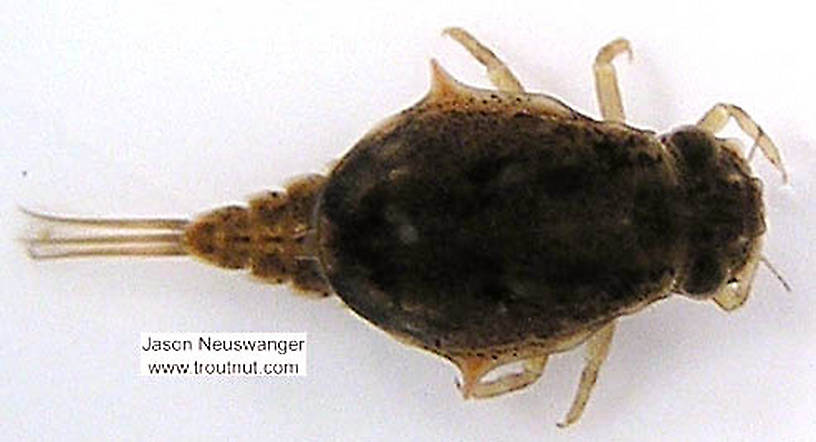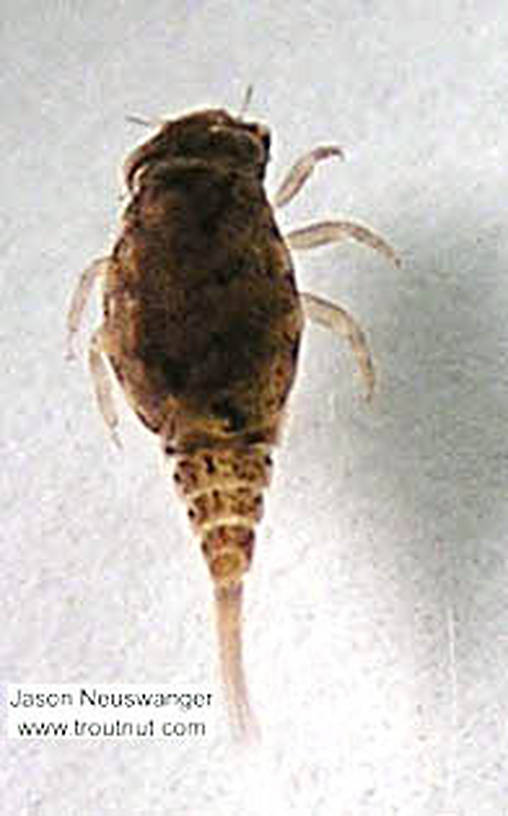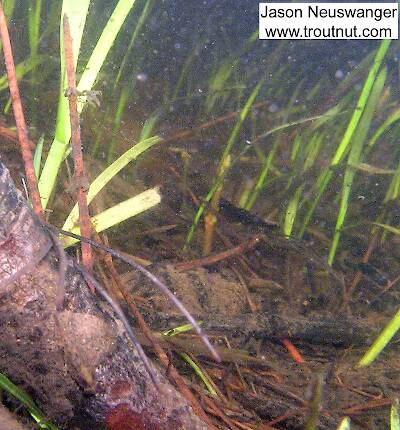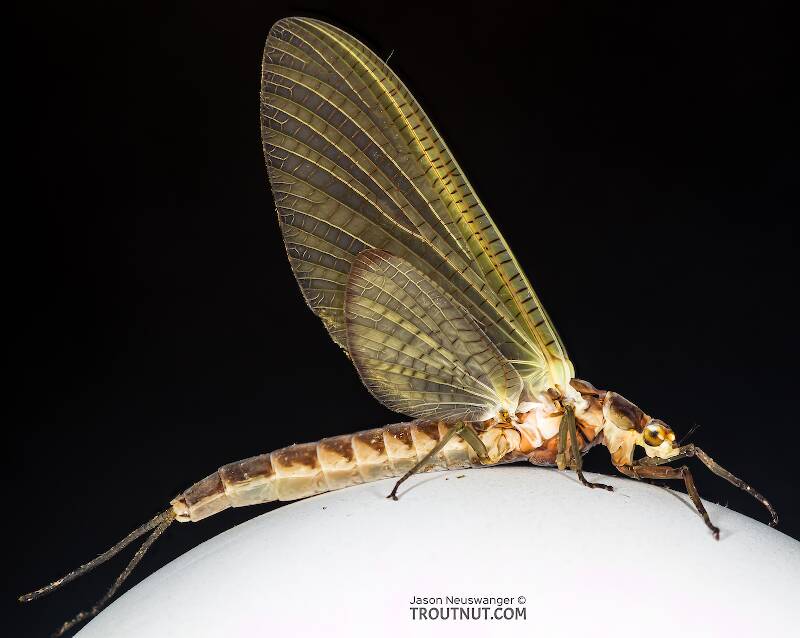
Hex Mayflies
Hexagenia limbata
The famous nocturnal Hex hatch of the Midwest (and a few other lucky locations) stirs to the surface mythically large brown trout that only touch streamers for the rest of the year.
Featured on the forum
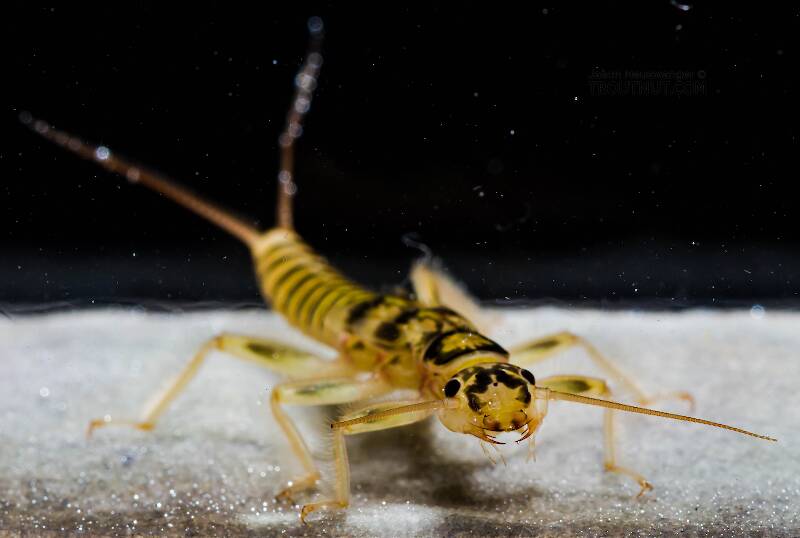
This one seems to lead to Couplet 35 of the Key to Genera of Perlodidae Nymphs and the genus Isoperla, but I'm skeptical that's correct based on the general look. I need to get it under the microscope to review several choices in the key, and it'll probably end up a different Perlodidae.

Troutnut is a project started in 2003 by salmonid ecologist Jason "Troutnut" Neuswanger to help anglers and
fly tyers unabashedly embrace the entomological side of the sport. Learn more about Troutnut or
support the project for an enhanced experience here.
Mayfly Family Baetiscidae (Armored Mayflies)
The mayflies of this family are known mostly for their curious shapes, but they can create excellent spinner falls, too. Read about Baetisca, the only genus in this family, for details.
Where & when
In 35 records from GBIF, adults of this family have mostly been collected during June (31%), May (23%), April (17%), July (11%), August (9%), and March (6%).
In 17 records from GBIF, this family has been collected at elevations ranging from 3 to 2625 ft, with an average (median) of 2152 ft.
Family Range
Identification
To determine whether a specimen of Ephemeroptera belongs to Baetiscidae, use the Key to Families of Mayfly Nymphs or Key to Families of Mayfly Duns and Spinners.
Specimens of the Mayfly Family Baetiscidae
2 Male Duns
2 Female Duns
2 Male Spinners
2 Female Spinners
15 Nymphs
1 Underwater Picture of Baetiscidae Mayflies:
Discussions of Baetiscidae
An important hatch
2 replies
Posted by Troutnut on Jun 26, 2006 in the species Baetisca laurentina
Last reply on Apr 8, 2013 by Willy
Based on reports from several sources and my own experiences, I'm beginning to think it is significantly more important than it has been credited for. The duns emerge by crawling out onto land, so they aren't important, but some of my most memorable fishing nights of 2005 were due to Baetisca spinner falls.
It is a tricky hatch to detect. I haven't seen more than a couple of their spinners in the air at a time, though some of my friends report spotting their swarms. Normally for me they just showed up on the water from unseen swarms upstream. They were mixed with spinners from Ephemerella invaria and Maccaffertium vicarium, among others, but the fish were relentlessly selective to the Baetisca laurentina spinners.
I wasted the better part of an hour flinging a sulphur imitation the first time I encountered a Baetisca fall. Like Ephemerella spinners, they can be hard to spot on the water, and they were much more sparse. I finally captured one, noticed the very different body profile, and since I didn't have anything remotely imitating it I continued to catch no fish. I returned the next night with an imitation with a robust, opaque body, and the fish went crazy for it.
I just finished reading through the account by Caucci and Nastasi in Hatches II about how the extremely important Ephemerella invaria sulphur species went unnoticed for decades because it was confused with Ephemerella dorothea. The maddening difficulty of some dorothea hatches was partially explained away once people understood this difference.
Although Baetisca is much less prominent than Ephemerella invaria, I suspect it has similarly been confused with well-known sulphur species in the rare locations and occasions where it is important.
It is a tricky hatch to detect. I haven't seen more than a couple of their spinners in the air at a time, though some of my friends report spotting their swarms. Normally for me they just showed up on the water from unseen swarms upstream. They were mixed with spinners from Ephemerella invaria and Maccaffertium vicarium, among others, but the fish were relentlessly selective to the Baetisca laurentina spinners.
I wasted the better part of an hour flinging a sulphur imitation the first time I encountered a Baetisca fall. Like Ephemerella spinners, they can be hard to spot on the water, and they were much more sparse. I finally captured one, noticed the very different body profile, and since I didn't have anything remotely imitating it I continued to catch no fish. I returned the next night with an imitation with a robust, opaque body, and the fish went crazy for it.
I just finished reading through the account by Caucci and Nastasi in Hatches II about how the extremely important Ephemerella invaria sulphur species went unnoticed for decades because it was confused with Ephemerella dorothea. The maddening difficulty of some dorothea hatches was partially explained away once people understood this difference.
Although Baetisca is much less prominent than Ephemerella invaria, I suspect it has similarly been confused with well-known sulphur species in the rare locations and occasions where it is important.
Baetisca in Vermont
1 replies
Last reply on Oct 25, 2009 by Taxon
Hi there; I just gathered a sample from our local Black River here in SE Vermont, and found a thriving population of armored mayflies. Wasn't sure what they were at first, with their bubble-humped backs and short little tails, but once I used my hand lens I realized they have tiny little "thorns" behind their last legs. Their mottled coloring resembles everything I've seen here, confirming my ID. I'll be sending off a sample to a friendly bug lab to let the pros look at them.
batflies
6 replies
Posted by Tnoetzel on Jan 14, 2009
Last reply on Jan 28, 2009 by Martinlf
are these flies the flies we call batflies? They look like a size 12 may fly on the water but have a very stubby abreviated and robust body. They are becoming more and more a factor where I fish on the Au Sable River. Do these spinners retract thier tail section into the thorax?
Similiar found in Minnesota
1 replies
Posted by PRohlfsen on May 11, 2007 in the species Baetisca obesa
Last reply on May 11, 2007 by Troutnut
I was fishing the Vermillion River in Minnesota south of the metro area and found a nymph similar to the Armored Mayfly Nymph. It did appear to be much more green in color. It was moving through a really muddy part of the stream, which I found interesting.
Can't wait to hit this hatch
Posted by Troutnut on Jun 12, 2006 in the species Baetisca laurentina
Last reply on Jun 12, 2006 by Troutnut
It sounds like the Baetisca hatch is really going on here in northern Wisconsin now. I've heard reports from more than one source about fishable Baetisca laurentina hatches on two of my favorite rivers. I bought some imitations and hopefully I'll be using them tomorrow!
Start a Discussion of Baetiscidae
References
- Caucci, Al and Nastasi, Bob. 2004. Hatches II. The Lyons Press.
- Knopp, Malcolm and Robert Cormier. 1997. Mayflies: An Angler's Study of Trout Water Ephemeroptera . The Lyons Press.
Mayfly Family Baetiscidae (Armored Mayflies)
Taxonomy
Genus in Baetiscidae
BaetiscaBatflies
25
140
Genus in Baetiscidae: Baetisca

